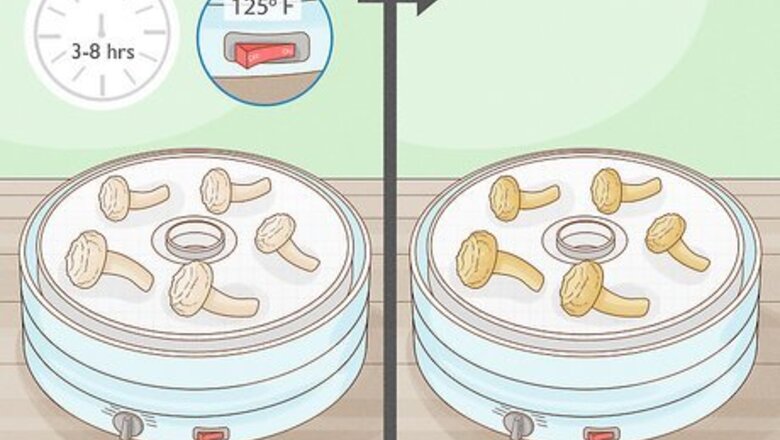
views
- To make mushroom tea, turn dry mushrooms into a fine powder with a coffee grinder or pestle and mortar.
- Select your preferred herbal tea and steep it with your mushroom powder in hot water for 15 to 30 minutes. Strain with a coffee filter before enjoying.
- Medicinal mushroom tea contains antioxidants that offer physical, cognitive, and mental health benefits with regular use.
Grinding the Mushrooms
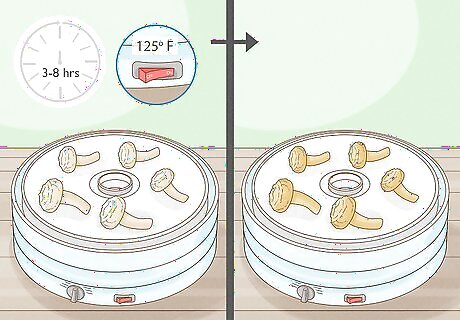
Dehydrate your mushrooms. If you have fresh mushrooms, arrange ⅛ a cup on a parchment paper-lined baking tray. Keep half an inch of space between each piece for air circulation. Slide the tray into a dehydrator at 125ºF (52ºC) for 3-8 hours until the mushrooms are breakable. Or, use an oven at its lowest temperature setting. Keep the door propped open for steam to escape, and flip the mushrooms every hour until they're dry. You can also lay the mushrooms flat on a paper towel for 2 to 4 days until they are brittle and breakable. If using store-bought dried mushrooms, you can skip this step.
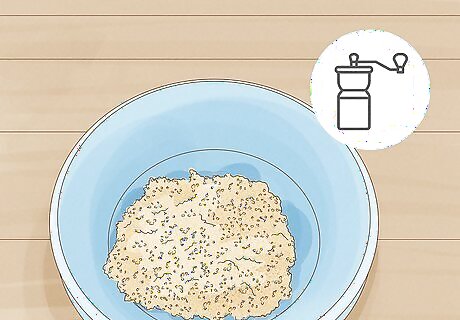
Grind your mushrooms into a powder. Take the dehydrated mushrooms into a coffee grinder to turn them into a fine powder. Turning it into a powder increases its protein and solubility content, meaning it’ll absorb faster in the water, and you may experience a quicker onset of its effects. Use a food processor or mortar and pestle as a substitute for a coffee grinder. Alternatively, use a sharp knife or kitchen scissors to chop the mushrooms into small pieces.
Brewing Mushroom Tea
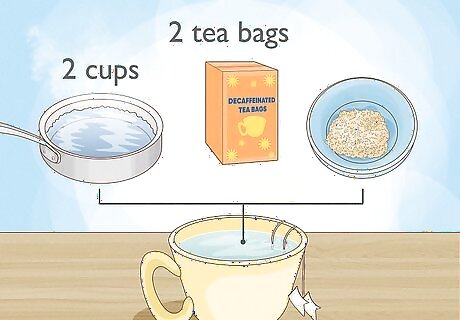
Mix 2 cups (473 mL) of boiled water, 2 tea bags, and your shrooms. Add 2 cups of water to a pot and allow it to come to a rolling boil. Once heated, turn the water off. Place 2 bags of decaffeinated tea of your choice into an empty cup and pour the hot water over them, then add your shrooms. 2-3g (1-2 tsp) of shrooms is the average medicinal dose. The amount you use depends on the flavor and intensity of benefits you want. Tea follows a 1:1 ratio, meaning if you boil 1 cup of water, use 1 teabag. For loose tea, use 1 teaspoon (2g) per cup.

Steep the tea for 3-5 minutes and the shrooms for about 30 minutes. Let the tea and mushrooms steep together for up to 5 minutes, then remove the tea bags with a spoon or fork (or, for stronger tea flavor, leave them in as long as the shrooms). Allow your mushrooms to steep for at least 15 minutes. The longer you steep the mushrooms, the stronger its flavors and effects will become. For sliced or minced fresh mushrooms, leave them steeping for up to 2 hours.
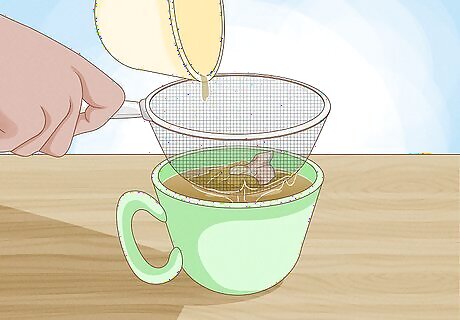
Strain your tea. Remove your teabags from the cup if you have not done so already. Pour the water with the steeping mushrooms through a coffee filter into another cup. If using sliced or minced mushrooms, discard the remains.
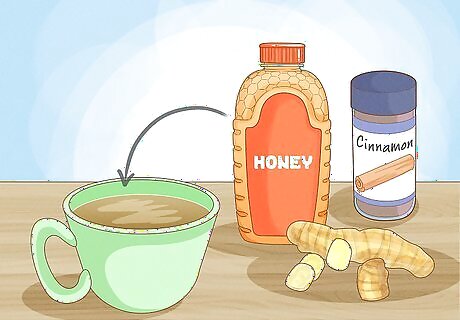
Add additional flavors. If you want to add more flavor depth to your tea, add cinnamon, ginger, or sweeteners like sugar or honey. Stir your additions with a spoon to ensure the flavors are evenly distributed, and enjoy! If you'd prefer an iced mushroom tea, allow the tea to cool down for another 10 minutes before pouring over ice.
Mushrooms and their Benefits
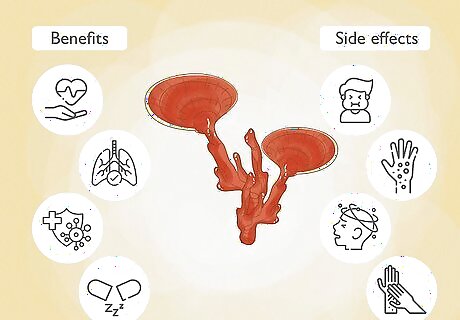
Reishi (lingzhi mushroom) Reishi mushrooms have a long history of use in China, Japan, and other Asian countries. They look like reddish-brown kidney-shaped caps that are found at the base or stump of trees like maple or hardwood. Benefits: These mushrooms may strengthen the heart and immune system, improve memory retention, and relieve cough, asthma, and insomnia. Side Effects: Over-use of Reishi mushrooms may cause dizziness, dry mouth, itching, nausea, upset stomach, or a rash.
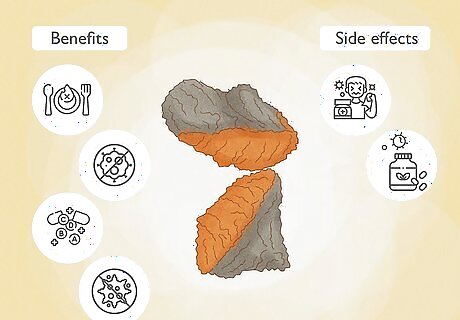
Chaga mushrooms Medicinal use of this rare mushroom dates back to the 12th century in Russia, Siberia, and Poland. It grows on mature birch trees and can be compared to burnt charcoal because of its looks. Benefits: Chaga mushrooms contain impressive anti-inflammatory properties, high antioxidants, and immunity regulation. Research also shows they may help breast cancer patients due to their anti-cancer and anti-tumor effects. Side effects: These mushrooms may interfere with some medications and supplements when over-used. Consult with your healthcare provider if you plan on incorporating high dosages into your diet.

Lion's mane mushrooms This mushroom has medicinal and culinary uses in Asia and Europe dating as far back as 450 BCE. Its name comes from its stringy, white fruiting body resembling a lion's mane. It can be found on fallen or dead beech and maple trees. Benefits: This mushroom assists with physical, cognitive, and mental health conditions including depression and cancer. It carries a variety of disease-fighting properties to protect the liver, kidneys, and heart. It is also useful for regulating blood pressure and blood sugar levels. Side effects: These mushrooms may interfere with some medications and supplements when over-used. Consult with your healthcare provider if you plan on incorporating high dosages into your diet.
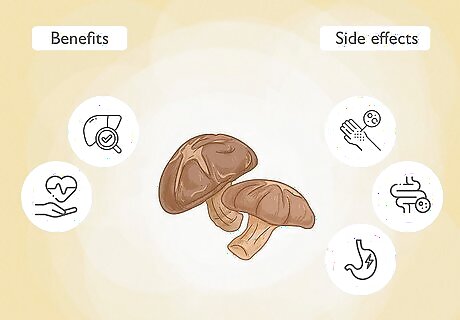
Shiitake mushrooms You may have seen these mushrooms at your local grocery shop. These familiar shrooms have ancient roots in Asia as a protein source and for their health benefits. They have a brown, umbrella-like cap with off-white gills. In the wild, they can be found growing from dead logs. Benefits: During colder seasons, shiitake mushrooms support your immune system while promoting your liver and heart health. Side effects: Over-use of Shiitake mushrooms may result in skin inflammation, skin sensitivity to sunlight, high levels of white blood cells, an upset stomach, or minor bowel obstruction.




















Comments
0 comment